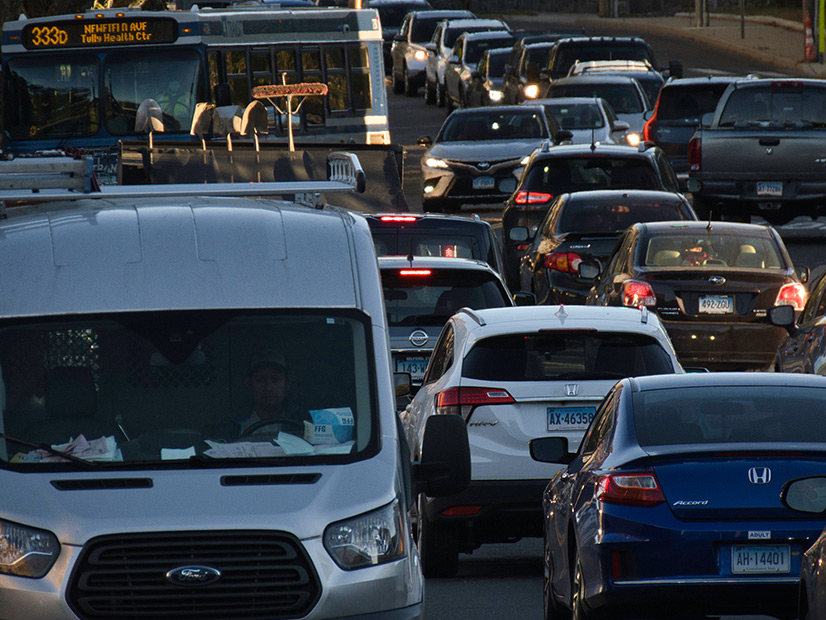Connecticut Gov. Ned Lamont on Tuesday said he would not pursue the Transportation and Climate Initiative Program (TCI-P) next year, arguing that rising gas prices make the enabling legislation “a pretty tough rock to push” through the General Assembly.
The pronouncement surprised environmental advocates and lawmakers alike despite the roller-coaster ride TCI-P has been on since December 2020 when Connecticut, Massachusetts, Rhode Island and D.C. signed a memorandum of understanding to launch the regional compact. This spring, a bill to enable TCI-P in Connecticut made it out of the General Assembly’s Environment Committee but not to a full vote. Calls to include TCI-P in a special session never came to fruition.
Lamont’s comments were first reported by the Hartford Courant.
TCI-P would institute a declining cap on allowable carbon emissions from gasoline and diesel fuel sold, and require suppliers to purchase carbon allowances at auction. Allowances are projected to generate revenues of up to $89 million in 2023 and as much as $117 million in 2032. The program would direct at least 50% of this money to communities overburdened by air pollution or underserved by the transportation system. It also would establish an equity and environmental justice advisory board to counsel the Department of Energy and Environmental Protection (DEEP) and Department of Transportation on equitable outcomes.
Republican lawmakers and gasoline trade associations labeled TCI-P as a “gas tax” in the form of potential pass-down costs from fuel suppliers to consumers. DEEP analysis shows participation could boost gas prices by 5 cents/gallon beginning in 2023, assuming fuel suppliers choose to pass down 100% of allowance costs to consumers. Multiple consumer protection safeguards, including a cost-containment reserve, would kick in at 9 cents/gallon. Opponents said the 5- to 9-cent increase applies to the first year of TCI-P alone, with prices potentially rising by as much as 26 cents.
Amy McLean, Connecticut director and senior policy advocate for Acadia Center, told NetZero Insider she has worked with a “diverse coalition” to push TCI-P and thought there was momentum heading into next year’s General Assembly session.
“The argument that this is not being supported by the people who in many ways are the most impacted by the health effects of transportation emissions is false,” McLean said. “That’s part of the surprise that we have because that was the main plank of this administration’s desire to support the Transportation Climate Initiative.”
State Rep. Joseph Gresko (D), co-chair of the Environment Committee, told NetZero Insider he understands Lamont “reading the political tea leaves” on spiking gas prices heading into an election year in 2022 and not allowing Republicans to weaponize passage of TCI-P. However, Gresko said that should not blur the fact that emissions are an issue in Connecticut.
“DEEP will be the first one to tell you that we have a problem with continued traffic on the road … and that’s not getting any better,” Gresko said.
The department released a report in September that stated Connecticut is off track from its statutory 2030 and 2050 economy-wide emission-reduction targets. The state emitted 42.2 million metric tons of carbon dioxide equivalent in 2018, the most recent year that data are available. That is 2.9% higher than the state’s 2020 emissions goal and a 2.7% increase from the 2017 inventory. In addition, at 15.8 million metric tons, transportation emissions exceeded the combined emissions of the electricity and residential sectors and have been rising since 1990 despite improvements in fuel economy.
Gresko said he sympathizes with environmental advocates who pushed TCI-P and continue doing it. He said he would be among the Democrats working with them and talking to DEEP about incentivizing electric vehicles and EV charging stations, as gas prices could continue to rise along with emissions.
“I’m more of the ilk of taking advantage of these high gas prices by pushing EVs and building out the infrastructure ourselves via subsidies and incentives,” Gresko said. “Then people would be hopefully making those larger decisions themselves saying, ‘Hey, I’m interested in an electric vehicle because I don’t want to pay XY and Z for gas.”
McLean said TCI-P is one part of the equation for reducing transportation emissions. She noted that the adoption of California emissions standards on medium- and heavy-duty vehicles and electrification of public transportation are two additional solutions, which could work in conjunction with TCI-P.
She also challenged Republican lawmakers to move beyond the “gas tax” argument and offer a solution.
“As far as the tax issue, it’s so easy; it’s low-hanging fruit,” McLean said. “That’s what you go to when you want to scare people. This is the Republican playbook. It’s not rocket science. I would challenge them to come up with a solution other than what has been put on the table. We have, and they have nothing.”



